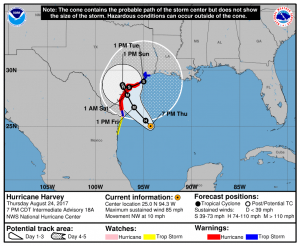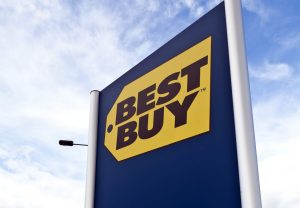Business. Ethics. It’s interesting to think about how these two seemingly antithetical words can sometimes go hand in hand. It’s not uncommon to hear stories of businesses going out of their way to help the local community. Take, for instance, Autodesk, a software corporation that allows employees to take 4 hours of paid time off every month to volunteer; or, General Electric who spent $219 million in 2012 on community service grants.
Unfortunately, not every business is like that.
In August 2017, Hurricane Harvey devastated Texas and Louisiana. Faced with death, displacement and disastrous floodwaters, the last thing survivors needed was to be taken advantage of by local stores. Yet, that’s exactly what happened.
According to a report by the Washington Post, the state attorney general’s office received 684 consumer complaints (as of August 30th) mostly regarding the price-gouging of essential items such as water and gas.
Best Buy, in particular, came under heavy fire after twitters user shared pictures of cases of bottled water being sold for $42 while other retailers charged $16-$32 for the same case online.
One Houston resident sent me a pic of water he saw being sold for *$42* at a nearby Best Buy. They were kind enough to offer $29 bottles too pic.twitter.com/8dKz3sJJM1
— Ken Klippenstein (@kenklippenstein) August 29, 2017
 Was Best Buy justified in raising their prices?
Was Best Buy justified in raising their prices?
Some people might argue that Best Buy’s approach was inherently capitalistic. They responded to an increase in demand for water by raising their prices. Invisible hand, right? If the main aim of a business is to maximize profit for its shareholders within legal boundaries (as economists such as Milton Friedman believe) then perhaps Best Buy did nothing wrong. What Best Buy did was terrible for the community, but ideal for its shareholders.
But just how ethical was their decision? Not very, is what I would say.
Freeman’s Stakeholder Theory states that a business is only successful if it creates value for all of its stakeholders: customers, suppliers, employees and financiers. Choosing to help one stakeholder (the shareholders) at the expense of another (the local community) could be considered a failing on the part of Best Buy’s managerial team.
Best Buy put out a statement saying that they don’t normally sell water by the case, and that the situation arose out of employees determining the price of a case by multiplying the price of one bottle of water by the number of bottles in a case.
Regardless, I believe Best Buy should have done their best to help survivors during their time of need by offering reduced prices on water instead of adding to their misery by taking more than needed out of their wallets.
To end with a quote by Henry Ford, “a business that makes nothing but money is a poor business.”
-430 words
Sources:
https://www.washingtonpost.com/news/business/wp/2017/08/30/99-for-a-case-of-bottled-water-texas-stores-accused-of-price-gouging-in-wake-of-harvey/?utm_term=.90c7fc0466b4
http://people.com/human-interest/companies-doing-great-things-in-their-communities/
https://mic.com/articles/81335/18-companies-that-are-doing-good-while-doing-well#.fIeob6Eq7
Best buy picture taken from: http://bgr.com/2017/07/21/best-buy-black-friday-in-july-2017-deals/
Hurricane Harvey forecast track taken from: http://www.theadvocate.com/baton_rouge/news/weather_traffic/article_7165bc30-893d-11e7-99e1-f3085130e564.html